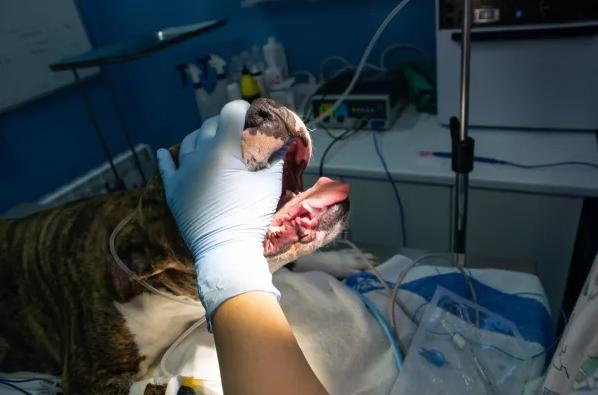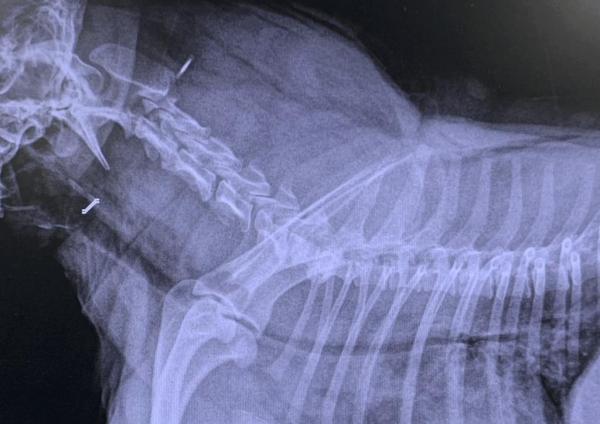My Dog Keeps Coughing as if Something Is Stuck in Their Throat



See files for Dogs
If you've ever noticed your dog coughing persistently, as if something is lodged in their throat, it's only natural to be concerned. Coughing in dogs can be a distressing symptom, and as a pet owner, you want to ensure the well-being of your furry companion. By understanding the potential reasons for your dog's cough, you'll be better equipped to take appropriate action and seek the necessary veterinary care.
In this AnimalWised article, we will explore the possible causes behind your dog's persistent cough and discuss various factors that can contribute to this particular symptom.
Partial airway obstruction
One of the primary causes of coughing in dogs is the partial obstruction of their airways, often resulting from their curious nature and tendency to explore the world through their mouths.
It is not uncommon for dogs to encounter objects while chewing, such as toys, sticks, or even food, that can lead to choking and the entry of foreign bodies into their respiratory tract. Depending on the size of the object, different scenarios can unfold.
If the foreign body has a similar diameter to the airway, it can cause a complete obstruction, leading to a critical situation resembling suffocation. However, when the object is smaller, it may only partially obstruct the airway, triggering a cough as a natural defense mechanism to expel the foreign body. This cough serves as the dog's attempt to clear its respiratory tract.
What to do?
If you notice that your dog's cough is productive, meaning that they are able to expel the foreign object on their own, you can closely monitor the situation. However, if the cough persists and the foreign body remains lodged, it is crucial to seek immediate veterinary attention.
A veterinary center should be able to assist you promptly in such cases. Typically, the vet may need to sedate the dog to perform an endoscopy, a procedure that allows them to examine the upper respiratory tract and safely remove the obstructing foreign body.
It is important to not attempt to remove the object yourself, as this can potentially cause further complications or injuries.
You might be interested in this other article, where we explain how long does it take a dog to expel a foreign body.

Infectious tracheitis
Tracheitis, which is the inflammation of the trachea, is a common condition in dogs. One of the most recognizable signs of tracheitis is a dry cough that often occurs in episodes and may end with retching or even vomiting.
This distinct coughing pattern often worries dog owners, as it seems as though their pet has something stuck in its throat. However, the reality is that there is no obstruction in the airways; rather, the cough is a result of the inflammation of the trachea itself.
When tracheitis is caused by pathogens, it is referred to as infectious tracheitis. The primary agents involved in infectious tracheitis are typically the following:
- Infectious tracheobronchitis: also known as "kennel cough" is a condition caused by a combination of viral and bacterial agents. This complex encompasses a range of viruses, including canine adenovirus 2, distemper, coronavirus, influenza, parainfluenza, herpesvirus, and pneumovirus. These viruses can affect the respiratory system of dogs, leading to inflammation and irritation of the trachea and upper airways.
- Fungal infections: fungi such as Aspergillus and Cryptococcus can invade the respiratory system, including the trachea, and lead to inflammation and respiratory symptoms. When dogs are exposed to fungal spores, usually present in damp or contaminated environments, the spores can be inhaled and establish an infection in the respiratory tract.
- Parasitic infestations: they can also contribute to tracheal irritation and coughing in dogs. Parasites such as lungworms or certain mites can invade the respiratory system and affect the trachea directly. Lungworms, for example, are a type of parasitic worm that resides in the lungs and airways of infected dogs. As they grow and reproduce, they can cause inflammation, leading to a persistent cough. Mite infestations, such as those caused by Demodex or Sarcoptes mites, can also affect the trachea and cause respiratory symptoms. These mites burrow into the skin and can spread to the respiratory system, leading to inflammation, coughing, and other respiratory signs.
What to do?
If your dog exhibits the characteristic coughing pattern described above, particularly if it persists over time, it is crucial to visit your trusted veterinarian for a thorough examination.
In the case of infectious tracheitis, a specific antibiotic treatment will be necessary. To determine the appropriate antibiotic, a tracheal lavage may be performed to obtain a sample that can identify the causative agent. Based on the results, the veterinarian can select an effective antibiotic for treatment. Additionally, if you have multiple animals, it is important to keep the affected dog isolated from the healthy ones to prevent further infections.
Remember, early intervention is key in managing tracheitis and ensuring the well-being of your furry companion.
For further information, we recommend reading our article where we provide an in-depth explanation of tracheitis in dogs, including its symptoms, common causes, and treatment options.
Non-infectious tracheitis
In addition to infectious tracheitis caused by pathogens, there are other forms of tracheitis that result from non-infectious processes, leading to inflammation of the trachea. These causes include:
- Alterations of the oropharynx: conditions affecting the oropharynx, such as elongated soft palate, laryngeal paralysis, or masses, can lead to tracheal irritation and coughing. These structural abnormalities can cause obstruction or interfere with the normal flow of air, resulting in respiratory symptoms.
- Congestive heart failure: occurs when the heart is unable to pump blood effectively, leading to fluid accumulation in the lungs and respiratory distress. The fluid buildup can irritate the trachea, causing a cough.
- Constant barking: dogs that excessively bark or strain their vocal cords may develop tracheal inflammation, leading to coughing episodes. The repeated trauma to the trachea from excessive barking can cause irritation and inflammation.
- Leash pulls: Pulling on a leash or collar can exert pressure on the trachea, leading to irritation and inflammation. This can result in coughing episodes, particularly during or after walks or when the dog is on a leash.
What to do?
When dealing with non-infectious tracheitis, the clinical presentation may resemble that of infectious tracheitis, with coughing attacks, retching, and even vomiting. However, the treatment approach differs significantly. In these cases, the primary focus is on managing the underlying cause of tracheal inflammation.
Therapeutic interventions for non-infectious tracheitis often involve the use of antitussives, such as codeine or butorphanol, to suppress the cough and provide relief. Anti-inflammatory medications, such as corticosteroids, may also be prescribed to reduce tracheal inflammation and alleviate symptoms.
If your dog displays symptoms consistent with tracheitis, it is crucial to seek veterinary attention. A thorough examination and diagnostic tests will help determine the underlying cause and guide appropriate treatment.
Do not miss this other article, where we detail the main 5 symptoms of congestive heart failure in dogs.
Tracheal collapse
If you are wondering why your dog is coughing as if it has something in its throat, tracheal collapse is indeed another possible cause to consider. Tracheal collapse refers to the progressive and irreversible degeneration of the trachea, specifically the dorsal membrane and tracheal rings. As the rings become weaker, they flatten, eventually leading to a complete collapse of the tracheal lumen.
Dogs affected by tracheal collapse, often small breeds in middle to advanced age and overweight, typically exhibit a distinctive dry and harsh cough that resembles a goose croaking. This characteristic coughing pattern regularly leads dog owners to believe that their pet has something stuck in its throat.
Additionally, affected dogs may experience wheezing or whistling sounds while breathing, along with other symptoms like difficulty breathing and intolerance to exercise.
What to do?
Tracheal collapse significantly impacts the well-being of the affected animal by hindering normal breathing. Therefore, as soon as any signs indicative of tracheal collapse are noticed, it is important to visit a veterinary center for a diagnostic evaluation and to establish an appropriate treatment plan.
Treatment for tracheal collapse can be approached from a medical standpoint, utilizing anti-inflammatories, bronchodilators, cough suppressants, corticosteroids, and a well-managed diet that promotes weight loss. Alternatively, surgical interventions can be considered, such as placing prostheses inside or outside the tracheal lumen or employing other surgical techniques.
The choice of treatment depends on the severity of the condition, the individual patient's needs, and the veterinarian's assessment.
Source: hospitalveterinariopuchol.com

Laryngeal paralysis
If you notice that your dog frequently coughs while eating, laryngeal paralysis could be the underlying cause. Laryngeal paralysis is a condition that affects the upper respiratory tract, where the laryngeal cartilages fail to open correctly during inspiration. It can have a congenital or acquired origin and may be unilateral or bilateral, depending on the extent of laryngeal involvement.
Dogs with laryngeal paralysis often exhibit abnormal breathing sounds, respiratory distress, exercise intolerance, and difficulties with vocalization or barking.
The paralysis of the laryngeal cartilages also impairs their ability to close properly during swallowing, which can result in choking episodes when drinking water or eating food. As a response, coughing fits may occur as the dog attempts to expel the food that has entered the respiratory tract.
What to do?
If you observe any of these symptoms, it is crucial to visit a veterinary center for an assessment. Unilateral laryngeal paralysis typically does not require treatment, as it usually does not significantly impact the dog's well-being. However, in cases of complete paralysis, surgical intervention is necessary.
Dogs with complete laryngeal paralysis often experience moderate to severe respiratory distress, which greatly affects their quality of life and overall well-being. Surgical treatment aims to address the paralysis and improve the dog's breathing ability.
To gain a thorough understanding of laryngeal paralysis in dogs, encompassing its causes, symptoms, and treatment options, we encourage you to explore our specialized article dedicated to this subject.
This article is purely informative. AnimalWised does not have the authority to prescribe any veterinary treatment or create a diagnosis. We invite you to take your pet to the veterinarian if they are suffering from any condition or pain.
If you want to read similar articles to My Dog Keeps Coughing as if Something Is Stuck in Their Throat, we recommend you visit our Breathing diseases category.







